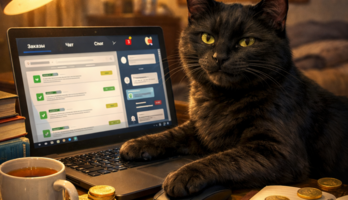flynn_gillian_gone_girl (1) (858987), страница 86
Текст из файла (страница 86)
“There is 982 dollarsand 12 cents left in the fund. As I’ve mentioned before, had you been able to replenish itwith any kind of regular work, we’d have been able to keep it a oat, but …” he tossedout his hands and grimaced, “things didn’t work out that way.”“What about the book, didn’t the book …?”“I’m sorry, Libby, the book did not.
I tell you this every year. It’s not your fault, butthe book … no. Nothing.”Years ago, to exploit my twenty- fth birthday, a publisher of self-help books askedme to write about how I’d conquered the “ghosts of my past.” I had in no way conqueredmuch of anything, but I agreed to the book anyway, talking over the phone with awoman in New Jersey who did the actual writing. The book came out at Christmas time,2002, with a cover photo of me sporting an unfortunate shag haircut. It was called,Brand New Day! Don’t Just Survive Childhood Trauma—Surpass It! and it included a fewchildhood snapshots of me and my dead family, packed between two hundred pages ofgloppy, positive-thinking porridge.
I was paid $8,000, and a smattering of survivors’groups invited me to speak. I ew to Toledo for a meeting of men who’d been orphanedyoung; to Tulsa for a special gathering of teenagers whose moms had been killed bytheir dads. I signed my book for mouth-breathing kids who asked me jarring questions,like did my mom cook pies. I signed the book for gray, needful old men peering at mefrom behind bifocals, their breath blasting burnt co ee and stomach acid. “Start a NewDay!” I’d write or “A New Day Awaits!” How lucky to have a pun for a last name. Thepeople who came to meet me always looked exhausted and desperate, standinguncertainly near me in loose packs. The groups were always small.
Once I realized Iwasn’t getting paid for any of this, I refused to go anywhere. The book had alreadybombed anyway.“It seems like it should have made more money,” I mumbled. I really wanted thebook to make money, in an obsessive childish way—that feeling that if I wanted itenough, it should happen. It should happen.“I know,” Jim Je reys said, having nothing more to say on the subject after sixyears.
He watched me drink my wine in silence. “But in a way, Libby, this presents youwith a really interesting new phase of your life. I mean, what do you want to be whenyou grow up?”I could tell this was supposed to be charming, but it brought a burst of rage up in me.I didn’t want to be anything, that was the fucking point.“There’s no money left?”Jim Je reys shook his head sadly, and started salting his newly arrived steak, theblood pooling around it like bright Kool-Aid.“What about new donations—the twenty- fth anniversary is coming up.” I feltanother splash of anger, for him making me say this aloud.
Ben started his killing spreearound 2 a.m. on January 3, 1985. The time stamp on my family’s massacre, and here Iwas looking forward to it. Who said things like that? Why couldn’t there have been even$5,000 left?He shook his head again. “There’s no more, Libby. You’re what, thirty? A woman.People have moved on. They want to help other little girls, not …”“Not me.”“I’m afraid not.”“People have moved on? Really?” I felt a lurch of abandonment, the way I alwaysfelt as a kid, when some aunt or cousin was dropping me o at some other aunt orcousin’s house: I’m done, you take her for a while. And the new aunt or cousin would bereal nice for about a week, try real hard with bitter little me, and then … in truth it wasusually my fault.
It really was, that’s not victim-talk. I doused one cousin’s living roomwith Aqua Net and set re to it. My aunt Diane, my guardian, my mom’s sister, mybeloved, took me in—and sent me away—half a dozen times before she finally closed thedoor for good. I did very bad things to that woman.“There is always a new murder, I’m afraid, Libby,” Jim Je reys was droning. “Peoplehave short attention spans. I mean, think how crazy people’re going about LisetteStephens.”Lisette Stephens was a pretty twenty-five-year-old brunette who’d disappeared on theway home from her family’s Thanksgiving dinner. All of Kansas City was invested innding her—you couldn’t turn on the news without seeing her photo smiling at you. Thestory had gone national in early February.
Nothing at all had happened in the case for amonth. Lisette Stephens was dead, and everyone knew that by now, but no one wantedto be the first to leave the party.“But,” continued Jim Je reys, “I think everyone would like to hear you’re doingwell.”“Awesome.”“What about college?” he chewed off a hunk of meat.“No.”“What about we try to set you up in some sort of office job, filing and whatnot?”“No.” I folded in on myself, ignoring my meal, projecting glumness.
That wasanother of my mom’s words: glum. It meant having the blues in a way that annoyedother people. Having the blues aggressively.“Well, why don’t you take a week and do some thinking on it?” He was devouring hissteak, his fork moving up and down briskly. Jim Je reys wanted to leave. Jim Je reyswas done here.This author is available for select readings and lectures. To inquire about apossible appearance, please contact the Random House Speakers Bureau atrhspeakers@randomhouse.com or (212) 572-2013.http://www.rhspeakers.com/.














